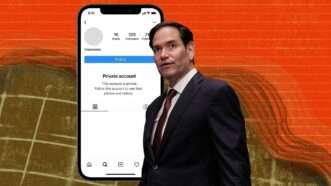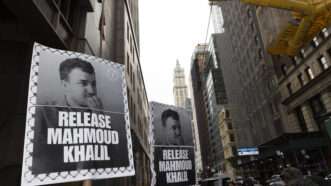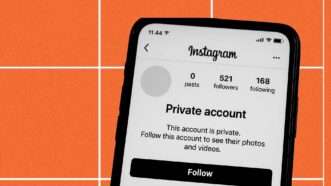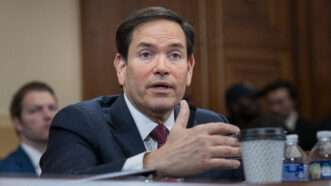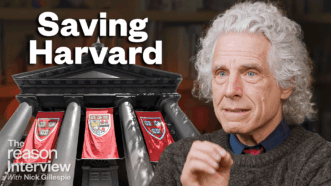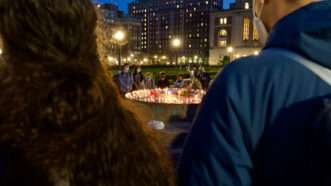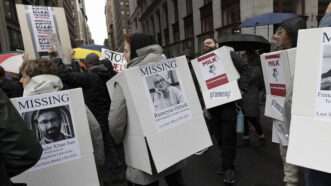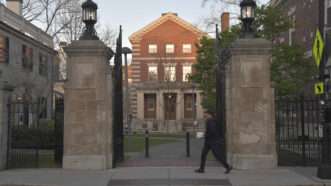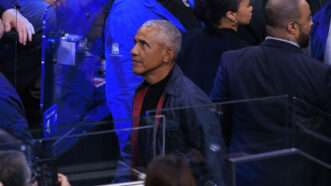Campus Free Speech
Defending Its Speech-Based Deportation Policy, the Trump Administration Says 'No Such Policy Exists'
The government's gaslighting strategy suggests that federal officials are not confident about the constitutionality of punishing students for expressing anti-Israel views.
The Trump Administration Says Its Speech-Based Deportation Policy 'Does Not Exist'
The government’s lawyers also say that supposedly nonexistent policy is perfectly consistent with the First Amendment.
$725K Settlement in University of North Texas Academic Freedom Case
The case settled while motions for summary judgment were pending; the plaintiff, Prof. Timothy Jackson, had prevailed against an earlier motion to dismiss, and the Fifth Circuit had also rejected defendants' appeal as to procedural matters.
Florida Can Forbid Transgender High School Math Teacher From Using Feminine Pronouns to Refer to Herself in Class, 11th Circuit Says
The appeals court vacated a preliminary injunction that had been based on her First Amendment rights
Student Visa Applicants Will Now Be Forced To Make Their Social Media Accounts Public
The Trump administration continues its war against disfavored speech.
The Rationale for Deporting Mahmoud Khalil Is Alarmingly Vague and Broad
Marco Rubio’s nebulous invocation of foreign policy interests is bound to have a chilling impact on freedom of speech, which is the whole point.
No Preliminary Injunctions Against Penn's Sanctions on Prof. Amy Wax
"[W]hatever harm she claims, it is not imminent, irreparable harm. Her damages, if any, are monetary damages."
Did Elected Officials Violate First Amendment by Orchestrating Public Criticism of (and Racism Allegations Against) Their Critic?
"[P]ublic condemnations, op-eds, and official complaints ... through proxies are independent constitutional violations" if the officials "engaged in conduct that was motivated by the plaintiff's protected speech and had the requisite chilling effect on First Amendment activity."
A Judge's Order Freeing Mahmoud Khalil Is Yet Another Loss for the Trump Administration's Immigration Agenda
A federal judge didn't buy the Trump administration's claims about why it was keeping Khalil in an federal immigration detention center.
Texas Legislators Say They Are Protecting Free Speech on Campus by Banning 'Expressive Activities' at Night
A bill awaiting the governor's signature represents a stark reversal from a 2019 law aimed at promoting "uninhibited debate."
A Judge Said the Excuse for Arresting Mahmoud Khalil Was Unconstitutionally Vague. Why Isn't Khalil Free?
U.S. District Judge Michael Farbiarz highlights the chilling impact of Marco Rubio's dubious rationale for deporting students whose views offend him.
Trump's Threats Against Musk and Newsom Reflect an Authoritarian Intolerance of Dissent
Even if the president was joking in both cases, he already has used his powers to punish people whose views offend him.
Anti-Israel Violence Does Not Justify Censorship of Pro-Palestinian Speech
The fight against anti-Semitism is undermined when it is conflated with mere criticism of Israel's government.
Texas Legislature Bans LGBT Student Clubs in K-12 Schools, Violating the Constitution and Federal Law
Signaling legislative contempt, one sponsor called the student groups "sex clubs." But in targeting the content of student speech the bill probably infringes First Amendment free speech rights and tramples the Equal Access Act of 1984
Harvard International Student With a Private Instagram? You Might Not Get a Visa.
Under new State Department guidance, having private or no social media presence "may be reflective of evasiveness and call into question [a student visa] applicant's credibility."
Claim Over Penn's Alleged Knowing Toleration of Anti-Semitic Behavior Dismissed,
though the court found the plaintiffs had standing to bring the claim, and gave them one last chance to amend their complaint to plausibly allege enough to allow the case to go forward.
Marco Rubio Sure Has a Weird Definition of Free Speech
Marco Rubio has announced a plan to deny visas to foreigners who censor Americans.
"Harvard University Loses Student and Exchange Visitor Program Certification for Pro-Terrorist Conduct"
"This means Harvard can no longer enroll foreign students and existing foreign students must transfer or lose their legal status."
Court Dismisses Palestinian Muslim Student Activist's Harassment Complaint Against Northwestern Law School, But Discrimination Claim Can Go Forward
The claims stemmed from the student's claim that classmates had harassed her, "doxed" her, and falsely accused her of assault in connection with the protests, and that as an indirect result she lost a job with a major law firm.
Judge Orders Tufts Grad Student Rumeysa Ozturk Be Released on Bail From Immigration Detention
Ozturk's continued detention "potentially chills the speech of the millions and millions of people in this country who are not citizens," said U.S. District Judge William K. Sessions III.
Steven Pinker: Can Harvard Be Saved?
The Harvard psychologist discusses recent gains for free speech at Harvard, growing political and ideological threats to academic freedom, and the importance of shared knowledge in sustaining truth and progress.
Immigrants and Radicals Have the Same Free Speech Rights as Everyone Else
Campus protests against Israel have revived debates over the limits of First Amendment protections.
Cato/FIRE Amicus Brief Against Speech-Based Deportations of Foreign Students
The brief gives a good explanation of why such actions violate the First Amendment.
Court Frees Palestinian Student Arrested by ICE at His U.S. Citizenship Hearing
A U.S. district judge called Mohsen Mahdawi’s detention a “great harm to a person who has been charged with no crime.”
Rumeysa Ozturk's Op-Ed Is Still the Only Public Justification for Her Arrest
"It is unthinkable that a person in a free society could be snatched from the street, imprisoned, and threatened with deportation for expressing an opinion the government dislikes," says FIRE.
Harvard University Should Emulate Hillsdale College and Cut Ties With the Government
To remain independent, institutions of higher education should end their reliance on taxpayer money.
Here Is Why Harvard Argues That Trump's Funding Freeze Violates the First Amendment
The administration's demands extend far beyond its avowed concern about antisemitism and enforcement of "civil rights laws."
Obama Is a Huge Hypocrite for Praising Harvard's Anti-Trump Stance
Harvard's law faculty previously criticized the Obama administration's assault on norms of free speech and due process.
ICE Arrests Palestinian Immigrant at His Citizenship Test
Columbia student Mohsen Mahdawi thought he was going to become an American. Instead, ICE whisked him away into detention.
ICE Retracts Threat To Stop Illegal 'Ideas' at the Border
The pro-censorship post was quite the Freudian slip from the Trump administration.
How Obama and Biden Paved the Way for Trump's Attacks on Universities
"Universities were bending over for federal funds long before Trump," writes Laura Kipnis.



